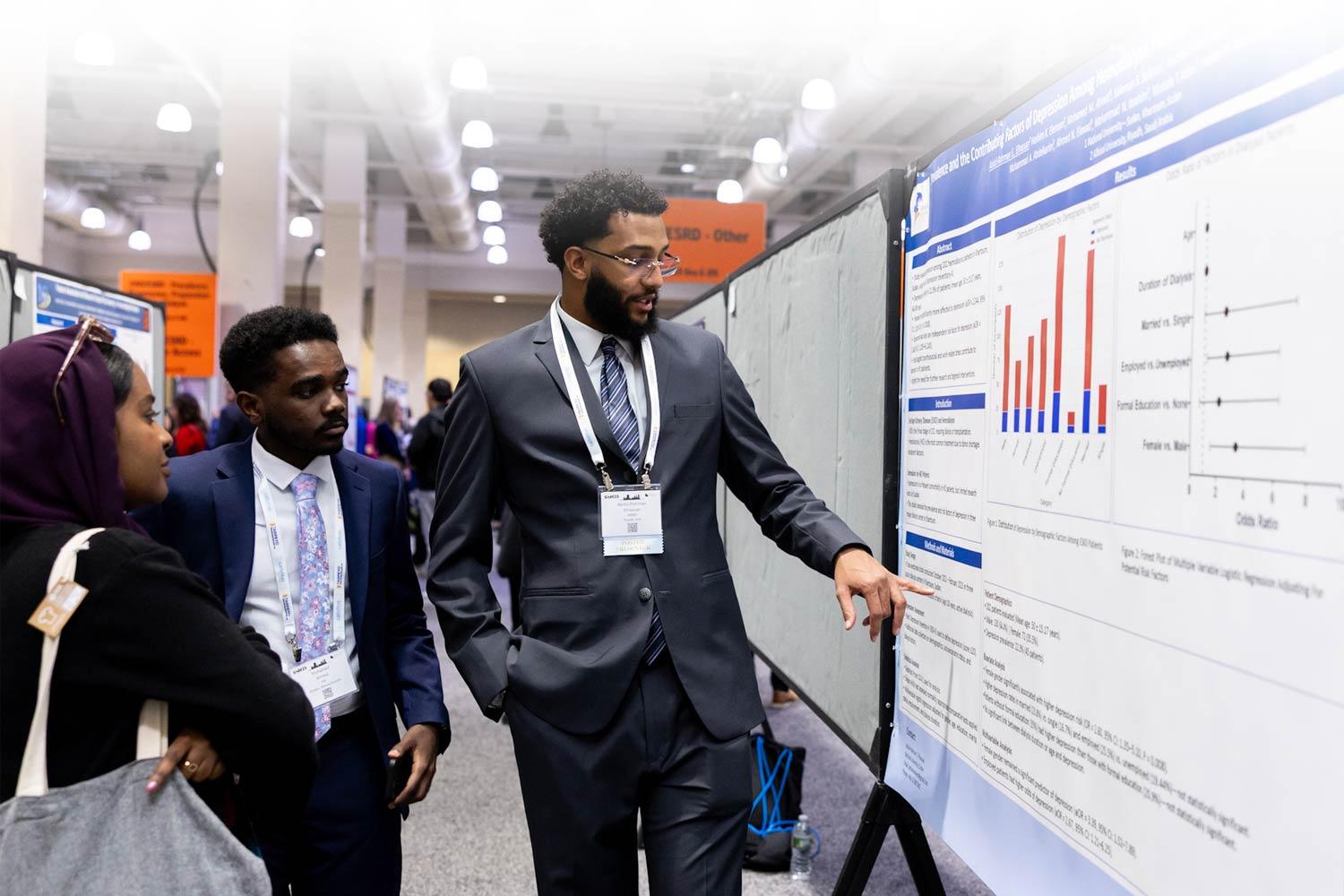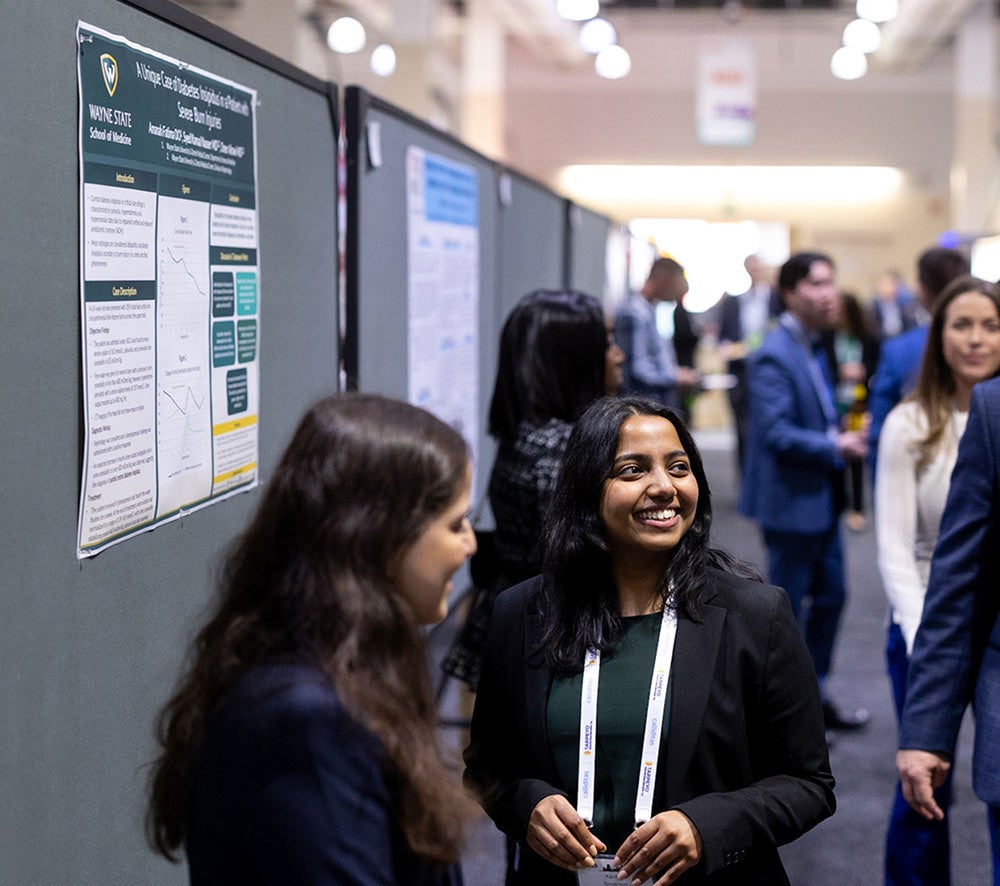Share your research with over 3,000 kidney healthcare professionals through our poster display and e-Poster gallery, fostering collaboration and knowledge exchange.
The Call for Late-Breaking Abstracts will open on January 14, 2026 and close on February 4, 2026 at 11:59pm ET.
Abstracts


SCM26 Abstract Timeline
August 29, 2025
General Abstract Submissions Open
December 02, 2025
General Abstract Submissions Close
January 14, 2026
General Abstract Author Notifications
Late-Breaking Abstract Submissions Open
February 04, 2026
Late-Breaking Abstract Submissions Close
Late-Breaking Abstract Author Notification
Abstract Details & Guidelines
Submission Overview
All abstracts will be submitted through the official SCM26 portal. Submission timeframes for General Research Abstracts and Late-Breaking Abstracts are listed below.
SCM26 Submission Page: https://cme.kidney.org/spa/courses/resource/r830-2026-spring-clinical-meetings/event/home/submissions
A CaseHippo/PERC account is required to submit an abstract. Authors working as a group should designate one submitting author to serve as the main point of contact. This individual will be responsible for submitting the abstract, receiving all communications from NKF, and ensuring that updates and information are shared with the full author team.
Key Dates and Deadlines:
General Research Abstracts:
August 29, 2025: General Research Abstract submissions open.
December 2, 2025 (by 11:59 PM ET): General Research Abstract submissions close.
Late-Breaking Abstracts:
January 14, 2026: Late-Breaking Abstract submission period opens.
February 4, 2026 (by 11:59 PM ET): Late-Breaking Abstracts submissions close.
Notifications: NKF will email notifications to the submitting author in early January 2026. It is the responsibility of the submitter to share the notification with the other contributors.
Edits and Withdrawals: Requests to revise or withdraw an abstract after the submission deadline must be submitted via email to clinicalmeetings@kidney.org, including all necessary details. All revisions and withdrawals must be received by January 30, 2026.
Journal Publication: NKF proudly publishes accepted abstracts as an electronic-only supplement in the May issue of the American Journal of Kidney Diseases (AJKD). Nephrology Social Work abstracts will be published in the Journal of Nephrology Social Work (JNSW).
Physical Posters and e-Posters: Accepted abstracts may choose to display a poster in-person at the NKF 2026 Spring Clinical Meetings in New Orleans, LA, upload an e-Poster to our virtual poster gallery, or both. Poster authors who choose to bring a poster to New Orleans, LA, are required to register for the conference and are strongly encouraged to attend the SCM26 Poster Author Q&A during the Exhibit Hall Opening Ceremonies on Thursday, May 7, 2026, from 5:15pm – 7:30pm CST. Posters brought onsite must be set up and dismantled according to the schedule provided; any posters left after 11am CST on Saturday, 5/9/26, will be discarded.
SCM Registration: Poster authors who choose to bring a poster to New Orleans, LA, are required to register for the conference. Registration for SCM26 opens in October 2025. The early-bird registration rate ends on March 10, 2026.
Submission Categories
Multiple research abstracts can be submitted by an individual. However, it is recommended to submit only one abstract per study. Submission of multiple abstracts on a single study may result in the rejection of one or more of the abstracts.
Abstract may be submitted in the categories below:
• Acute Kidney Injury/ICU Medicine
• Case Reports
• CKD/ESRD – Anemia
• CKD/ESRD - Cardiovascular Disease
• CKD/ESRD - Mineral Metabolism and Kidney Stones
• CKD/ESRD - Prevalence, Progression and Preparation for Dialysis
• CKD/ESRD - Vascular Access
• CKD/ESRD – Other
• Diabetic Nephropathy
• Electrolyte and Acid Base Abnormalities
• Glomerular Diseases
• Health Disparities *New in 2026!
• Health Policy
• Hereditary Kidney Disease/PKD
• Home Dialysis - Home Hemodialysis/Peritoneal Dialysis
• Hypertension
• Interprofessional Collaboration
• Late-Breaking (Only results from major clinical trials or epidemiological studies will be considered for review.)
• Nutrition
• Transplantation
• Other
Submission Guidelines
Processing Fee: The $60 processing fee per abstract submission is nonrefundable. The fee must be paid at the time of submission by credit card. Please note your abstract is not submitted until you have completed the payment. Ensure you hit the submit button following successful payment. Abstracts with unpaid or unresolved submission error messages will not be reviewed.
Character Limit: Each abstract is limited to a maximum of 2,500 characters including spaces, title, and author information. Authors may upload a figure in jpeg or png format which will reduce the maximum characters by 400 to 2100 characters. In addition, authors may upload up to 3 supplementary files in pdf, jpeg, mp3 or mp4 format with a max size of 25 MB. Supplementary files will appear online only; they will not be published.
Abbreviations & Subtitles: Use of standard abbreviations is desirable, e.g., RBC. Use kg., gm., mg., ml., L, and %. Place a special or unusual abbreviation in parentheses after the full word or phrase the first time it appears. Use numerals to indicate numbers, except to begin sentences. Do not use subtitles, e.g., Methods, Results.
Case Reports: Please note that “Case Reports” is its own separate topic. Case Reports submitted should be novel and should have a single, well-defined message with meaningful clinical, diagnostic or therapeutic implications adequately supported by the clinical evaluation and diagnostic tests.
Abstract Submission: The submitting author will be prompted to provide the following information:
Details: Select a topic, discipline, and keywords.
Contributors: Submit the names, emails addresses, affiliations, and institutions for all authors involved.
Introduction: Statement of the purpose of the study, program, project or case report.
Methods: Statement of the methods or interventions used.
Results: Summary of the results presented in sufficient detail to support the conclusion.
Conclusion: Statement of the implications, conclusions reached or key message.
Eligibility
General research and late-breaking abstracts must be electronically submitted through the NKF abstract submission site by their respective deadlines.
NKF professional membership is not required for abstract submission, authorship, or presentation.
Abstracts with unpaid or unresolved submission error messages will not be reviewed. If the submitter does not receive a confirmation email titled “Abstract Submission Confirmation,” please check spam or junk folders first. If it’s still not found, contact clinicalmeetings@kidney.org to verify the status of your abstract submission.
Abstracts will not be considered if the research has already been published, presented at another meeting, or shared at a press conference prior to the NKF 2026 Spring Clinical Meetings.
The submitting author of an accepted abstract will have the option to bring a poster onsite for SCM26. However, acceptance of an abstract does not waive the registration fee.
Upon abstract submission, all contributors must agree to the NKF Embargo Policy.
NKF Embargo Policy
In compliance with the Securities and Exchange Commission's Regulation FD (Fair Disclosure), accepted abstracts are made available to the public on the NKF website and are published in AJKD or JNSW (dependent on discipline) in advance of the meeting. Thus, the first release of the abstracts is a public release. Accepted abstracts are embargoed until the time of publication. Please note that abstract content published in AJKD or JNSW is copyrighted. Rights for reproduction or distribution must be requested through the respective journals. Poster content is not formally published within a journal and therefore the rights for reproduction or distribution remain with the author.
Academic institutions, private organizations, and companies with products whose value may be influenced by information contained in an abstract may issue a press release to coincide with the availability of an abstract. However, the NKF continues to require that information that goes beyond that contained within the abstract, e.g., discussion of the abstract done as part of a scientific presentation, is to be embargoed until the start of SCM26, 8am ET on May 7, 2026. Violation of this policy may result in the abstract being withdrawn from the meeting and other measures deemed appropriate. Journalists failing to abide by the embargo may have their press credentials revoked.
Copyright Policy
Poster and abstract content submitted to the NKF Spring Clinical Meetings remains the intellectual property of the original authors. Authors are free to reuse their own content, while any third-party requests to reproduce material should be directed to the submitting author for permission.
Journal Publication & Abstract e-Gallery
NKF proudly publishes the majority of abstracts as an electronic-only supplement in the April issue of the American Journal of Kidney Diseases (AJKD). Nephrology Social Work abstracts will publish in the spring issue of the Journal of Nephrology Social Work (JNSW).
All accepted abstracts are available in the SCM25 Portal's Abstract Gallery, including those who chose to submit an e-Poster for virtual display. Explore the SCM25 abstracts by category, author, institution, city, or country using the link below!



